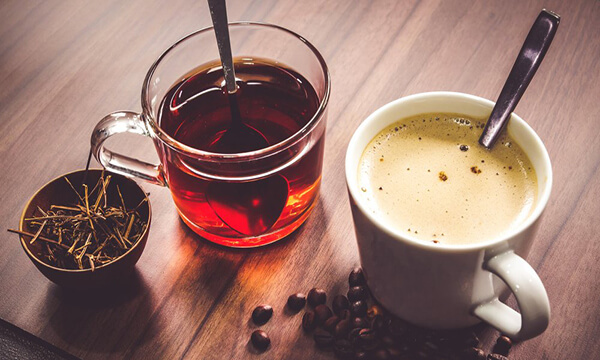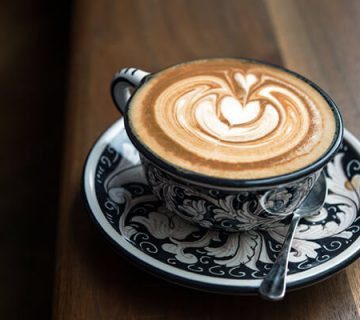Coffee and tea are two of the most widely consumed beverages across the globe. Both drinks provide various health benefits, making them appealing options for many individuals. In fact, when enjoyed regularly, both coffee and tea can positively impact our well-being in numerous ways.
The primary differences between these two beverages lie in their flavors, aromas, and beneficial compounds. Tea is often associated with relaxation after a long day, while coffee is typically used to enhance energy and physical performance in the morning.
This brings up some important questions for enthusiasts of these drinks:
Are one of these beverages superior to the other? Is it feasible to start your day with tea instead of coffee?
In this article, we will delve into a comparison of coffee and tea. We aim to highlight their respective benefits and ultimately determine which drink may be better for health. So let’s explore further.

Coffee vs. Tea
Coffee
Coffee is a complex mixture containing around 1,000 different chemicals. The quality of a cup of coffee can be influenced by factors such as the type of coffee beans used, brewing methods, the amount of beans utilized, and how they are prepared.
It’s important to note that individuals have varying sensitivities to caffeine. Statistics show that caffeine doses ranging from 50 to 300 mg can enhance fitness levels, energy, and focus; however, consuming larger amounts may lead to discomfort, sleep issues, or an increased heart rate.
Research indicates that moderate coffee consumption as an energy booster is generally safe and beneficial. Like any food or beverage, coffee should be enjoyed with moderation.

Coffee beans have a lot of caffeine
Tea
Following water, tea is one of the most widely consumed beverages in the world. This beloved drink was quickly spread by traders globally, leading to a significant increase in its popularity.
Tea has earned a special place on evening tables, particularly due to its promotion in the United Kingdom during the mid-nineteenth century. Taking a brief break with a cup of tea can help alleviate daily fatigue.
The type of tea is determined by where the leaves are harvested and how they are cultivated and processed. Among the various types, dark tea is as well-known as green, oolong, and white teas.
Consumers can enjoy tea in two main forms: tea bags and loose leaves. Loose-leaf tea, available in tin cans or pouches, allows for better control over the quantity consumed. On the other hand, teabags provide convenience while still containing quality tea leaves.
The brewing time affects the strength and color of the tea; longer brewing results in darker tea. It’s worth noting that adding sugar, cream, or milk can reduce the concentration of beneficial polyphenols found in tea. For optimal health benefits, consider drinking pure tea without any additives.

Tea is one of the most popular beverages on the planet
Coffee vs. Tea
The caffeine content in coffee and tea plays a crucial role in distinguishing between the two. Depending on the variety, a cup of coffee typically contains between 80 to 185 mg of caffeine, while tea averages lower, ranging from 15 to 70 mg per cup.
Coffee is produced using roasted coffee beans. The beans are extracted from their natural state to create a stable raw product. After roasting, they are ground into a powder that is steeped in boiling water before being filtered to produce the final beverage.
Tea, on the other hand, is an aromatic drink made by infusing tea leaves in hot water or a teapot. It ranks as the second most consumed beverage globally after water. Both green and black teas contain compounds that support cellular health, promote heart wellness, and exhibit anti-cancer properties.

Coffee vs. Tea
Below is a comparison of tea and coffee based on various factors:
| Comparative Factors | Tea | Coffee |
|---|---|---|
| Source | Derived from Camellia sinensis | Derived from the coffee plant |
| Caffeine Content | Contains less caffeine than coffee; often used therapeutically | Higher caffeine levels can lead to various health issues |
| Flavor | Offers a wide range of flavors based on type and origin; generally milder | Typically has a stronger, bolder flavor with higher acidity |
| Brewing Temperature | Brewed at lower temperatures to retain caffeine in leaves | Brewed at higher temperatures and pressures for stronger extraction |
| Health Benefits | Enhances mental alertness and cognitive function; aids digestion (vomiting, diarrhea), headaches, bone health, solid tumors, and skin conditions | Reduces risk of cardiovascular disease; may help with insomnia prevention and protect against Alzheimer's disease and type 2 diabetes |
This comparison highlights key differences between these two popular beverages regarding their composition, taste profiles, brewing methods, and health benefits.

Tea vs. Coffee
The Most Significant Differences Between Coffee and Tea
When comparing coffee and tea, several key differences stand out:
- Caffeine Content: A typical cup of coffee contains approximately 80 to 185 mg of caffeine, while a cup of tea has significantly less, averaging between 15 to 70 mg.
- Health Effects: Coffee contains cafestol, a compound that can be harmful in excessive amounts. In contrast, tea is known for its heart-healthy benefits, helping to lower cholesterol and unsaturated fats.
- Cost: Brewing coffee at home typically costs around 16 cents per cup. Conversely, the price of coffee tends to be higher than that of tea; a homemade cup of tea usually costs at least five cents.
- Popularity: Coffee is more widely consumed than tea in the United States, with about 54% of individuals drinking coffee daily compared to 51% who drink tea.
Reasons People Consume Tea
Tea offers several health benefits that contribute to its popularity:
- Low Calorie Count: Tea is generally low in calories, making it a healthy beverage choice.
- Chronic Disease Risk Reduction: Research suggests that regular tea consumption may lower the risk of chronic diseases.
- Blood Sugar Management: Tea can assist in managing blood sugar levels effectively.
- Inflammation Reduction: Certain compounds in tea help reduce inflammation in the body.
- Bone Strengthening: Drinking tea may contribute to stronger bones over time.
- Oxidative Stress Reduction: Tea is rich in antioxidants that help combat oxidative stress.
These factors highlight why many people choose tea as part of their daily routine alongside or instead of coffee.

Tea can help to strengthen your immune system
Why Do People Consume Coffee?
Coffee is a popular beverage for several compelling reasons:
- Longevity: Studies suggest that coffee consumption may contribute to a longer life.
- Glucose Management: Coffee can aid in managing the body’s glucose levels, helping to regulate blood sugar.
- Heart Health: Drinking coffee has been associated with a reduced risk of heart disease, promoting overall cardiovascular health.
- Reduced Risk of Parkinson’s Disease: Regular coffee drinkers may have a lower likelihood of developing Parkinson’s disease.
- Liver Health: Coffee is beneficial for liver function and may help protect against liver diseases.
- DNA Protection: Compounds in coffee are believed to strengthen DNA, contributing to cellular health.
- Colon Cancer Prevention: Research indicates that drinking coffee may significantly reduce the risk of colon cancer.
- Alzheimer’s Disease Risk Reduction: Regular coffee consumption has been linked to a lower risk of Alzheimer’s disease.
- Stroke Risk Lowering: Drinking coffee may also decrease the likelihood of experiencing a stroke.
Conclusion
In this article, we aimed to provide comprehensive information about two widely consumed beverages worldwide—coffee and tea. Both drinks offer unique benefits and potential drawbacks that consumers should consider.
After reviewing the findings, choose the beverage that aligns best with your needs and lifestyle preferences. If you’re looking to reduce caffeine intake while still enjoying a flavorful drink throughout the day, tea is an excellent option.
While tea generally contains less caffeine than coffee, certain varieties like matcha and yerba mate can have higher caffeine levels and still provide an energy boost.
On the other hand, if you seek a more intense caffeine kick to power through your day without fatigue, coffee might be your go-to choice. However, it’s essential to remember that excessive consumption of either beverage can lead to health issues and mental challenges. Moderation is key!


![How to make latte coffee [Simple and fast]](https://coffeebook.net/wp-content/uploads/2022/07/latte-coffee-360x320.jpg)

